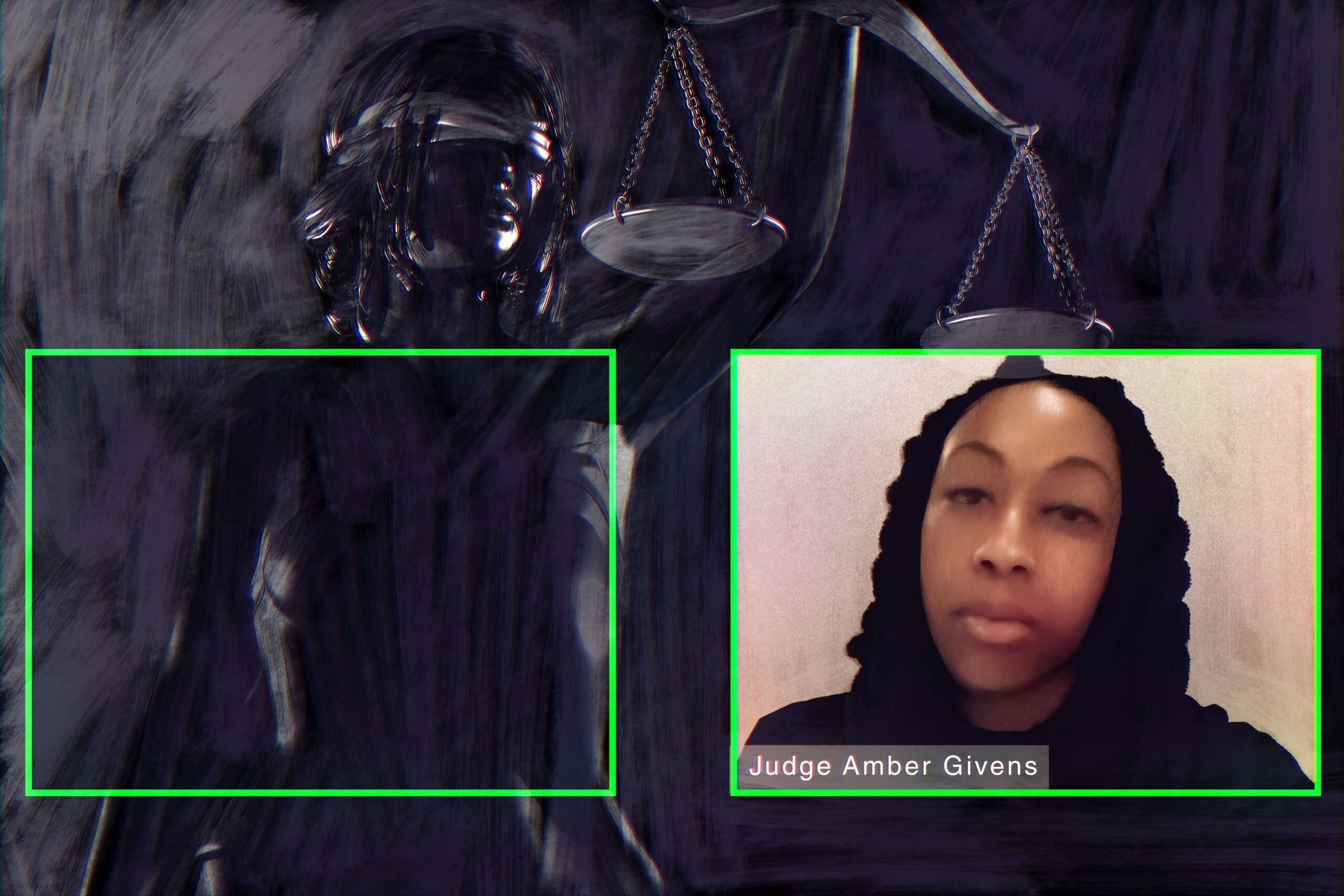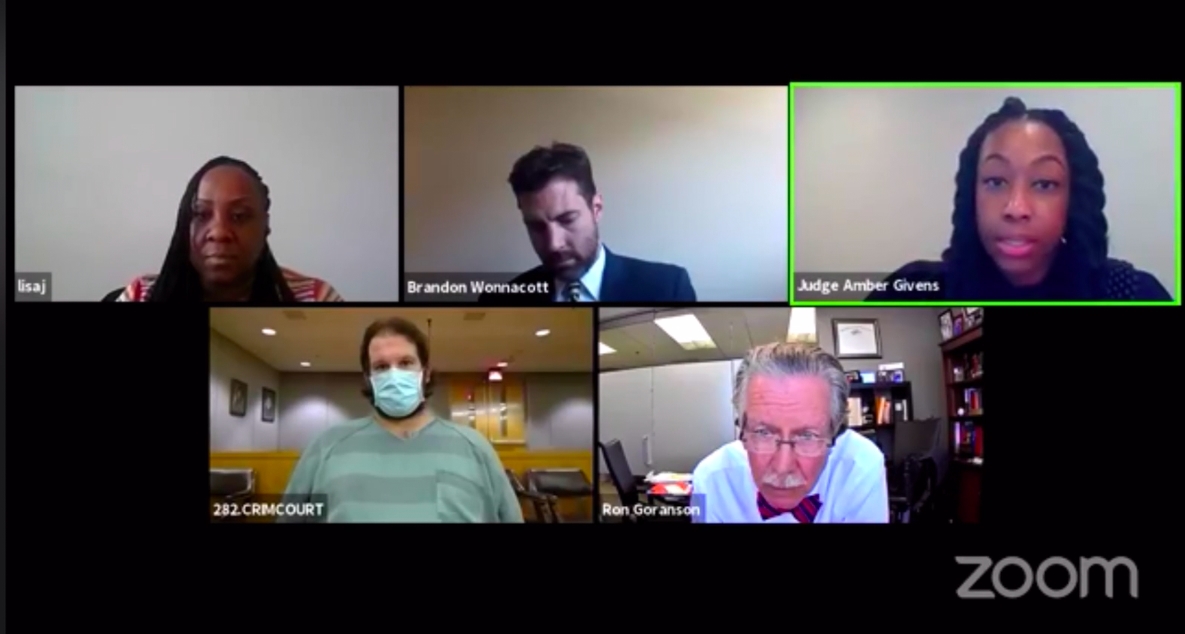
Texas Rangers Investigation Sheds Light on Dallas Judge’s ‘Bizarre’ Behavior
Dallas County Judge Amber Givens was accused of having her court coordinator impersonate her during a 2021 Zoom bond hearing, prompting a Rangers inquiry.

After a 2021 bond hearing on Zoom, Dallas Judge Amber Givens became the subject of a nearly two-year Texas Rangers investigation and an ongoing judicial misconduct inquiry. The bizarre accusation: that Givens had her court coordinator impersonate her during the video proceeding held to review the bond of a criminal defendant.
In September, the Texas Rangers wrapped up their Public Integrity Investigation, and Kaufman County District Attorney Erleigh Wiley opted not to prosecute either woman.
But the Texas Rangers’ investigative report, recently obtained by the Texas Observer, indicates that Givens participated in the 29-minute hearing for eight seconds at most and that witnesses say the defendant referred to her court coordinator as “judge” or your honor without being corrected.
Wiley issued a statement about her decision not to prosecute Givens or Warfield that included unusual criticism of Givens’ actions.
“I believe that Judge Amber Givens should have done better that day and in the days after,” she wrote. “There may be many reasons to censure the conduct of Judge Amber Givens, but as a prosecutor, I find there are no criminal reasons. No judge is above the law, but turning bad conduct into a criminal matter is not the solution.”
She went on to say that Givens “is not beyond reproach” and that “the litigants, attorneys, and citizens of Dallas County deserve better, and as such, the future of Judge Amber Givens…will be determined by the voting citizens of Dallas County.”
As part of a two-year investigation, the Rangers interviewed all the participants in the hearing, various court and probation officials and pulled personal and office phone records from Warfield and Givens from the day and time of the bond hearing. They found that during most of the hearing, the judge was actually on the phone with GM Financial and GEICO Insurance and that once, when Warfield tried to reach her, the judge let the call go to voicemail. According to the report, the judge’s Cadillac SUV had been repossessed that same morning.
There are at least four unresolved related complaints against Givens pending with the State Commission on Judicial Conduct that allege her actions in that hearing and in other matters violate judicial canons, which require all judges to uphold the “integrity” of the judiciary and avoid even the “appearance of impropriety.”
Givens’ attorney did not respond to a request for comment by the Observer’s deadline; this story will be updated if comment is provided.
An unusually large group of Dallas lawyers had previously complained about Givens’ courtroom behavior even before the controversial Zoom courtroom meeting occurred. The Rangers’ report provides new details about that event.
On August 3, 2021, Floyd Aaron—who’d been accused of violating the conditions of the deferred adjudication of a 2015 burglary charge—his lawyers, and prosecutors were scheduled to appear before Givens to agree to new bond conditions. The meeting would be virtual, as it was in the midst of the surge of COVID-19’s Delta variant. This was typical for court cases in Dallas at the time. What wasn’t typical was the way the meeting went down.

Judge Givens’ Zoom profile appeared on the screen, but the video was off. The voice behind the video was Givens’ former court coordinator Arceola Warfield, whom Givens later said she had asked to log into the account and announce that the judge would participate via speakerphone.
In affidavits, several participants stated they were aware that Warfield was behind the judge’s account during most of the hearing. But at least one lawyer said it wasn’t clear Warfield was the one behind the Zoom picture. The defendant addressed Warfield “judge” and as “your honor,” more than once, Aaron and other witnesses said. Shortly after the incident, the Dallas Criminal Defense Lawyers Association filed a formal complaint against Givens, alleging that she had instructed Warfield to impersonate her. This was one of several complaints attorneys have lodged against Givens, who’s held the office since 2015.
Because of the confidential nature of its investigations, the judicial conduct commission would not comment.
The Texas Rangers’ Public Integrity Unit began its own investigation of the allegations on December 16, 2021, at the request of Dallas County District Attorney John Creuzot. Investigators were tasked with finding evidence as to whether the allegations were true, and, if so, whether Givens or Warfield had committed a crime. In Texas, impersonating a public servant “with intent to induce another to submit to the person’s pretended official authority or to rely on the person’s pretended official acts” is a third-degree felony.
In Texas, a court coordinator’s duties do not extend to serving as a magistrate, the Ranger’s report says.
Warfield, a court official, was using an official court Zoom link and ostensibly acting on Givens’ authority. Givens later claimed to be participating via phone. But as part of their probe, the Rangers found that the only call between Warfield and Givens during the hearing—which lasted from 9:50 a.m. to 10:18 a.m.—was an eight-second call from the court coordinator to the judge at 9:52 a.m. Rangers found no texts between the two during that time.
During the eight-second call, Givens could have given brief instructions to participants before hanging up, but the judge did not participate in the rest of the proceeding.
The Ranger’s findings appear to cast doubt on statements the judge made to the media about her participation.
“Judge Amber Givens provided quotes to the media stating, ‘I was on a phone call,’ and ‘my court coordinator placed me on speakerphone, and I advised the parties that I would approve the agreement and to make sure that the defendant received the conditions of the bond,’” the Rangers’ report says. Rangers scoured other public statements Givens made relating to the incident, including a radio interview during which she said “I don’t know how many times I can say I was on the phone unless Verizon is in on the conspiracy with all of us.”
Investigators also obtained records related to the Zoom docket, historical usage records related to the judge’s Facebook account, and transcripts from Microsoft Teams and email conversations.
The Rangers’ investigation, seemingly exhaustive, also included interviews with court personnel who were present during the hearing. One written statement from a community supervision officer noted they “never heard Judge Givens’ voice” during Aaron’s hearing. Another person on Givens’ docket that morning said they “didn’t recall hearing Judge Givens’ voice at all that morning.”
Amanda Kent, who wrote official case notes about the hearing, “recalled putting a line in her narrative, Judge Givens not present.”
In an email to her supervisors following the bond hearing, Kent wrote “some shady things occurred in court…please review my narrative dated today regarding a bond hearing that happened. Please let me know if I need to change it for any reason. I also need you all to be aware because it’s totally weird.” She later redacted those notes from the reporting system after consulting with her supervisor, the report says.
Her supervisor responded by asking Kent to remove the case note “and just put a bond was set by the coordinator…”
The Rangers’ report states that Givens and Warfield refused to cooperate with the investigation through their attorneys. “I was scheduled to interview Judge Givens on 1/13/2022, but her attorney Nicole Knox contacted me on 1/12/2022 and informed me that Judge Givens decided to decline my request for an interview,” wrote Weatherford in the investigative report.
In December 2021, shortly after Givens recused herself from Floyd Aaron’s case, the judge’s lawyer sent a letter to Dallas County Defense Lawyers Association members Amanda Branan and Deandra Grant, requesting that the lawyers who filed the judicial misconduct complaint related to the Zoom incident retract their “defamatory” allegations.
Instead, they continue to press for disciplinary action, which does not require a finding that the judge violated a law.
James Harrington, founder of the Texas Civil Rights Project and legal misconduct expert, said Givens’ case was “bizarre.” He said it has become more common during the Zoom-court era for judges to have court staffers handle “routine stuff”—but they have to be upfront when they do so. “I was more disturbed by the lack of candor,” he told the Observer.
Two district attorneys were involved in reviewing whether the Zoom impersonation claims might violate Texas law —Dallas County DA John Creuzot, who recused himself, and Kaufman County DA Wiley, who took his place.
According to the report, Wiley met with Texas Ranger Ronnie Hubbell in September, shortly after he took over the investigation. “After many hours of investigation, research, and deliberation with the Kaufman County District Attorney’s office, it was decided that the case would not be submitted for prosecution,” the investigative report states.



